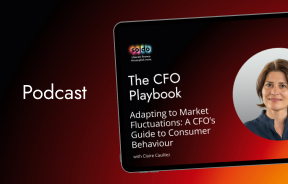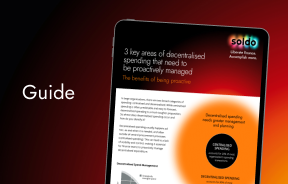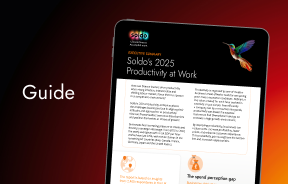When hiring for finance roles, every CFO dreams of stacking their finance team with the best of the best. But while top notch technical skills are undoubtedly important, they’re not actually the be-all and end-all of a high-performing team.
Team chemistry is important, too. Chemistry with one another – but also the wider organisation. Your people need to be able to work well with others and communicate effectively.
More to the point, if you want to future-proof the finance function, experience has to be balanced with people who, while not necessarily experts (yet), are adaptable, eager to learn, and able to face new challenges with an open mind.
So how do you strike the right balance of skills, experience, and youthful enthusiasm? What do you look out for to gauge potential and evaluate whether somebody would be the right fit for a role?
And, most importantly, how do you ensure your carefully-chosen team members continue to be invested and engaged enough to stick around?
Figuring out your hiring needs
The trickiest part of building out your finance function is identifying what roles you need to fill and who is best-placed to fill them.
Does it have to be a senior person with a track-record in that specific area, or would the role be a good fit for someone more junior (or someone with experience in a different, but related field)? And do you even need to handle this role in-house, or could you outsource it?
Ada’s Long Dinh believes it all depends on which stage of its development the business is in. “It’s really important to understand and be aware of what the company needs at different stages of its lifecycle,” he says.
“Before I joined Ada, we outsourced finance to a virtual CFO and virtual controller. And that’s a very common model for early-stage startups… But when we grew from 10 to 30 people, we quickly realised the demand and complexity meant we needed somebody to be there in-house.”
Dinh believes hiring is also about eliminating bottlenecks and making the business more resilient. And that, he argues, means making hiring decisions in service of a longer-term goal.
“If any team member, for any reason, cannot show up to work, we need to have a backup plan,” he says. “The business should be able to continue to operate without depending on a single person.”
According to Imply’s Tony Russo, an effective way to gauge if you have enough people with the right mix of skills on your team is to benchmark yourself against your competitors.
“One of the things I’ve starting doing more of over the last five years is to look at… companies at our stage (or close to it) in our space,” he explains. “This helps me figure out if we’re under-staffed or under-resourced.”
Comparing numbers, particularly metrics such as gross revenue and annual recurring revenue is especially useful for setting priorities and identifying areas where you have an immediate need. This, Russo says, enables you “to scale better and not burn people out”.
Soft vs hard skills: getting the balance right
Once you identify a gap, it’s tempting to go with the candidate who has the most impressive technical abilities or greatest amount of experience.
But, without “diminish[ing] the importance of… understanding things like treasury, accounting, and taxation,” says Deloitte’s Steve Gallucci, “that needs to be augmented and enabled with [other] capabilities.”
In a recent webinar we hosted in partnership with the Institute of Chartered Accountants in England and Wales (ICAEW), Flinder’s Alastair Barlow observed that soft skills become increasingly important the higher up you move on the career ladder.
By the time you reach a managerial position, he argues “you’ve proved yourself technically”. To succeed in your more senior role, you need to know “how to coach… how to manage people… how to manage projects”.
But with the finance function taking on an ever more strategic role, soft skills are critical at every level of the hierarchy.
“If you choose data analytics, which is quite a new field within finance,” Barlow continues, “you need really technical skill sets… And then you’ll also need people who can relay what’s going on to the business in a non-technical way”.
Finding the right fit
So how do you evaluate whether a candidate has the right mix of hard and soft skills when hiring for a finance role?
For 1Password’s Jeannie De Guzman, it often boils down to what she calls the “lunch test”.
“I like to hire people for finance roles that I could go to lunch with and just have a conversation with,” she explains. The conversation doesn’t have to be about finance, but she believes that the manner in which the person expresses themselves tells her a lot about their skill set.
“There are people who are very long-winded [and] go into a tonne of detail,” she continues. “And then there’s people that are really concise. I tend to lean towards concise when I’m looking at a role that will be talking to the business. Those who are detailed may be great for technical roles where that don’t need to talk to others.”
By contrast, Nuvemshop’s Tatiana Rezende takes a more direct approach, being “overly transparent… and try[ing] to feel if the person is willing to show discomfort.”
This, she says, helps her get a better idea of candidates’ adaptability, open-mindedness, and willingness to take risks. Particularly when it comes to areas that are important to the business.
How to boost finance team employee retention
Illumio’s Anup Singh argues that, “if you hire smart people, you probably don’t need to do a tonne to motivate them, because they’re intrinsically driven.”
But this innate desire to succeed can also be a double-edged sword. When highly-motivated people feel their current working environment makes it difficult for them to flourish, they’ll quickly move on. So leaders’ jobs, Singh continues, is to remove the obstacles that stand in these people’s ways.
In part, this entails ensuring your staff has space to develop. This doesn’t necessarily have to mean continuous upward movement. But “you have to create opportunities for [people] to continue to grow,” says Picsart’s Craig Foster.
There needs to be a balance, he continues, “between having people that can provide mentorship and leadership, and young talent that you can move through a system very, very quickly based on their own attributes.”
Or, as fintech consultant Nick Levine put it: “If you can say, ‘This isn’t the sort of place where we do the same thing every day,’ that can make your company an exciting place to be.”
Opportunities, says Long Dinh, also need to be distributed fairly, especially now that more people than ever are working remotely. “Regardless of your location,” he says, it should be clear that “you have an equal chance of getting a promotion, providing value, and contributing to the team.”
But while career advancement is an important incentive, Jeannie De Guzman believes it will only go so far. Particularly given the stresses of working in finance. Staff members, she argues, also need to feel supported in more practical ways.
“Oftentimes, the finance teams get slammed with a lot of overtime,” she says. “So an empathetic culture… is really important.
“We work a lot on morale… providing wellness days [finance team members] can actually take — and not watch the rest of the company take… [and] adjusting deadlines to make sure the team gets the rest they need.”
Research confirms the effectiveness of such initiatives. Happy employees work harder and are more loyal to the business.
A finance team is only as good as the people
It’s no exaggeration to say that the finance function has completely transformed over the past decade.
Finance is an increasingly important strategic partner that helps the business move forward and achieve its goals. And that requires a much broader set of skills than just the ability to work a spreadsheet.
“The days of siloed roles focused on one single domain are coming to an end…” says Steve Gallucci. The modern finance function, he argues, requires people who are effective communicators. Your people should have “tech fluency…[and] are able to understand… multiple aspects of finance, not just one particular area.”
More to the point, the work doesn’t stop once new hires sign on the dotted line. If you want to retain them, you need to create the conditions in which they can thrive.
“Finance has a career ladder, so everybody knows that they can move up,” concludes Jeannie De Guzmann. The difference between organisations who excel at retaining talent and those who don’t is that, in the former people feel momentum. They “can say ‘Hey, things are moving. I have a career path, I can put my hand up. I don’t have to go look outside the company.'”

























